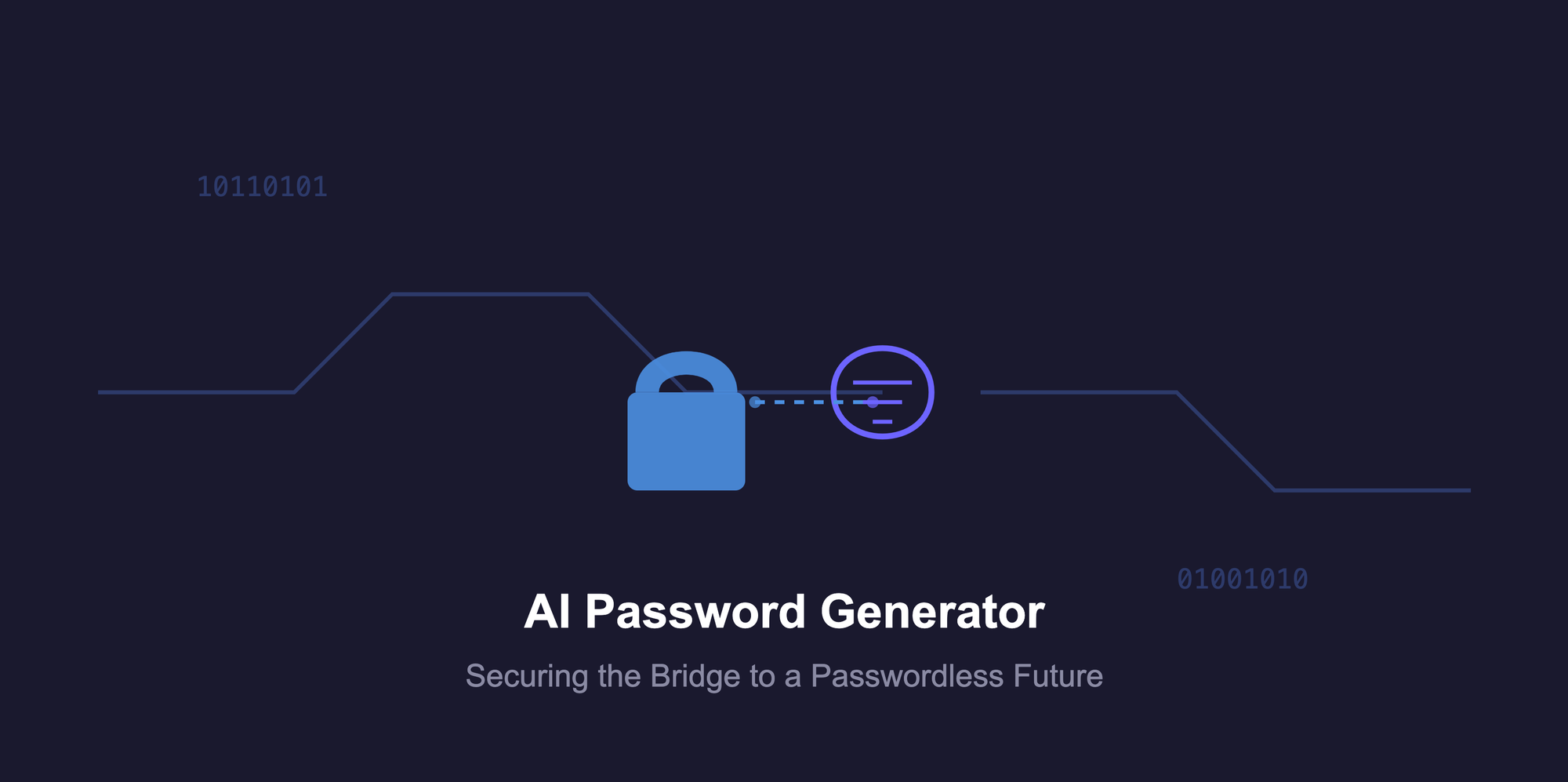AI Password Generators: Bridging the Gap to a Passwordless Future
AI password generators represent the cutting edge of digital security, combining advanced algorithms with user convenience. While 81% of data breaches stem from password vulnerabilities, these intelligent tools create uncrackable passwords while smoothing the transition to a passwordless future.

In an era where cybersecurity breaches cost organizations an average of $4.88 million (IBM Security, 2024), password security remains a critical vulnerability. Studies show that 81% of data breaches are caused by weak or stolen passwords, while 65% of people still reuse passwords across multiple accounts (Verizon Data Breach Report, 2024). Despite these alarming statistics, passwords currently secure over 100 billion online accounts globally - a number that continues to grow exponentially with digital transformation.
The Evolution of Password Security
The history of passwords dates back to ancient times, with military sentries using watchwords to identify friendly forces. However, the modern concept of computer passwords emerged in 1960 at MIT, when Fernando Corbató implemented the first computer password system for the Compatible Time-Sharing System (CTSS). This revolutionary step in digital security would shape authentication methods for decades to come.
Key Milestones in Password Evolution:
- 1960s: First computer password implementation
- 1970s: Introduction of encryption for stored passwords
- 1980s: Development of password policies and complexity requirements
- 1990s: Rise of password managers and automated tools
- 2000s: Implementation of multi-factor authentication
- 2010s: Emergence of biometric authentication
- 2020s: Movement toward passwordless solutions and AI-driven security
Despite this evolution, we find ourselves at a crucial intersection: while passwordless authentication represents the future, current digital infrastructure still heavily relies on traditional passwords. According to recent surveys, 67% of organizations plan to adopt passwordless authentication by 2025, yet only 22% have fully implemented such solutions today.
The Password Crisis and the Rise of AI Solutions
Before diving into AI password generators, it's crucial to understand the scale of the password crisis we face today. The average business employee manages 191 passwords, while cyber attacks targeting password credentials increased by 274% in 2022 alone. Traditional password creation methods are no longer sufficient to combat sophisticated cyber threats, leading to the emergence of AI-powered solutions.
Understanding AI Password Generators
AI password generators represent a significant advancement over traditional random password generators. These intelligent systems leverage machine learning algorithms to create passwords that are not only highly secure but also optimized for various requirements:
- Pattern Recognition: AI systems analyze common password patterns and vulnerabilities to avoid creating passwords that could be easily cracked.
- Contextual Awareness: The generator considers the specific requirements of different platforms and services, automatically adapting to their password policies.
- Memorability Balance: While maintaining security, AI generators can create passwords with subtle patterns that make them slightly more memorable for humans when needed.
Key Benefits of AI Password Generators
Enhanced Security
- Utilizes complex algorithms to generate truly random and unpredictable passwords
- Adapts to emerging security threats and password-cracking techniques
- Creates unique passwords that avoid common dictionary words and patterns
Intelligent Customization
- Automatically adjusts to specific website requirements
- Balances security with usability
- Creates passwords that meet complex policy requirements without human intervention
Time Efficiency
- Eliminates the need for manual password creation
- Reduces the cognitive load of generating secure passwords
- Streamlines the process of meeting various password requirements
Best Practices for Using AI Password Generators
- Use in Conjunction with Password Managers
- Store generated passwords securely
- Enable easy access across devices
- Maintain unique passwords for each account
- Regular Password Updates
- Set reminders for periodic password changes
- Use the generator to create new secure passwords
- Keep track of password changes in your password manager
- Backup Authentication Methods
- Enable two-factor authentication when available
- Keep recovery codes in a secure location
- Document backup access methods
The Transition to Passwordless Authentication
While AI password generators provide an excellent interim solution, the future of authentication is undeniably passwordless. Here's why:
Benefits of Passwordless Authentication
- Eliminates password-related vulnerabilities
- Reduces user friction and frustration
- Increases security through biometric and token-based methods
- Lowers support costs related to password resets
Current State of Passwordless Adoption
Many organizations and platforms are gradually implementing passwordless options:
- Biometric authentication (fingerprint, face recognition)
- Hardware security keys
- Magic links and one-time codes
- Public key cryptography
However, complete passwordless adoption faces several challenges:
- Legacy system compatibility
- Integration complexity
- User adaptation and education
- Cost of implementation
Bridging the Gap
Until passwordless authentication becomes universal, AI password generators serve as a crucial bridge:
- Immediate Security Enhancement
- Provides robust security for existing password-based systems
- Helps maintain unique passwords across platforms
- Reduces the risk of password-related breaches
- Preparation for Transition
- Familiarizes users with automated security tools
- Builds trust in AI-driven security solutions
- Enables gradual migration to passwordless systems
Future Outlook
As we move toward a passwordless future, the role of AI in authentication will continue to evolve:
- Integration with biometric systems
- Enhanced threat detection and response
- Adaptive authentication based on user behavior
- Seamless cross-platform authentication
Conclusion
While passwordless authentication represents the future of digital security, the reality is that passwords will remain a part of our digital lives for some time. AI password generators provide a sophisticated solution to bridge this gap, offering enhanced security and convenience while we transition to a passwordless future. By adopting these tools today, users and organizations can better protect their digital assets while preparing for the authentication methods of tomorrow.
Remember: The best approach is to embrace both current and future security measures - use AI password generators for existing password-based systems while actively adopting passwordless options whenever they become available. This hybrid approach ensures maximum security during the transition period and positions you well for the passwordless future ahead.

